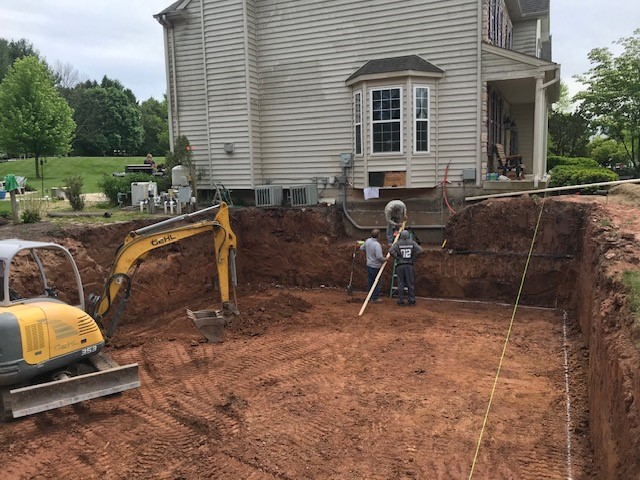Lancaster Trenching - Expert Trenching Solutions in Lancaster, Ohio
Wiki Article
Comprehensive Excavation Strategies: Grasping the Basics for Success
In the world of building and civil engineering, the significance of effective excavation techniques can not be overstated. The careful planning, accurate execution, and thorough attention to detail called for in excavation projects require a thorough technique that includes various basic aspects. From first dirt evaluation to the implementation of security actions and regular progression monitoring, mastering these core components is vital for attaining success in any excavation venture. However, real mastery exists not simply in recognizing these basics but in effortlessly incorporating them to browse the complexities of excavation projects with skill.Comprehending Excavation Job Preparation

The preliminary stage of any type of excavation project is the preparation stage, where important decisions are made that can dramatically influence the outcome of the job. Recognizing the project timeline, scope, and budget plan constraints is critical for developing a comprehensive excavation strategy that makes sure the task's success.
One trick aspect of excavation job planning is the advancement of an in-depth timeline that describes the sequence of target dates, activities, and landmarks. By carefully taking into consideration all these factors during the planning phase, excavation tasks can be carried out successfully and effectively, leading to successful end results - lancaster excavation.
Dirt Evaluation and Website Analysis
Performing thorough dirt analysis and site examination is an important action in the preparation phase of any kind of excavation project. Soil analysis entails identifying the structure, structure, and properties of the dirt at the excavation site. This info is vital for comprehending the soil's bearing ability, moisture web content, and potential for erosion, which are crucial consider figuring out the excavation approaches and equipment needed for the project.Site assessment goes past soil analysis and incorporates a more comprehensive assessment of the general site conditions. This analysis includes recognizing any type of prospective dangers, such as below ground energies, environmental issues, or unstable surface, that might impact the excavation process. By completely examining the site, project managers can establish effective excavation approaches that prioritize security, performance, and ecological defense.
Utilizing sophisticated technologies like ground-penetrating radar, dirt sampling, and drone surveys can enhance the accuracy and performance of dirt evaluation and site analysis. Spending time and resources in these initial actions can inevitably conserve time and avoid costly delays or issues during the excavation procedure.
Devices Option and Use
Efficient excavation jobs depend heavily on tactical devices option and usage to make certain optimum efficiency and efficiency. Choosing the ideal equipment for the job is essential in taking full advantage of effectiveness and minimizing downtime. Factors such as the sort of dirt, deepness of excavation, and project scope play a considerable function in figuring out the most suitable devices for the job at hand.
Along with selecting the suitable equipment, appropriate application is crucial to task success. Operators needs to be educated to take care of the equipment securely and effectively - dump truck companies in ohio. Normal maintenance checks and prompt repairs aid protect against malfunctions and guarantee constant performance throughout the task
Precaution and Regulations Conformity
In the realm of excavation projects, focusing on security measures and conformity with policies is critical to making certain a legally audio and safe and secure operational atmosphere. Precaution encompass a variety of practices, consisting of performing complete website evaluations, executing correct signage and obstacles, and supplying adequate security training for all workers entailed in the excavation procedure. Adherence to laws, such as OSHA requirements in the United States, makes sure that the excavation project fulfills the essential criteria to shield workers, spectators, and the surrounding setting.
Monitoring Progression and Adjusting Approaches
Just how can predict managers efficiently track the improvement of excavation tasks and adapt their techniques accordingly to optimize outcomes? Surveillance development is crucial for guaranteeing that excavation jobs remain on track and fulfill deadlines. Task managers can utilize different devices and strategies to track progression, such as everyday progress reports, routine site inspections, and progressed monitoring technologies like drones and GPS tracking systems. By continuously monitoring the job's development, supervisors can determine any possible hold-ups or problems early on and take proactive actions to address them.
Final Thought
In final thought, grasping the basics of thorough excavation methods is vital for the success of any kind of task. By recognizing project planning, evaluating dirt and website conditions, selecting appropriate tools, following safety and security regulations, and monitoring progress, task managers can make sure a reliable and smooth excavation click here now process. Applying these strategies will certainly cause effective results and minimize potential threats or setbacks during the excavation task.
The preliminary phase of any excavation job is the preparation stage, where important decisions are made that can dramatically impact the end result of the job. Comprehending the project range, budget, and timeline restrictions is crucial for developing a detailed excavation plan that makes sure the job's success.
Just how can predict managers effectively track the advancement of excavation projects and adapt their methods accordingly to optimize end results? By closely keeping track of development and being eager to adjust techniques, job managers can boost the general success of excavation jobs.
By understanding job planning, examining dirt and website problems, picking ideal tools, abiding with safety regulations, and monitoring progression, job managers can guarantee a smooth and reliable excavation procedure.
Report this wiki page